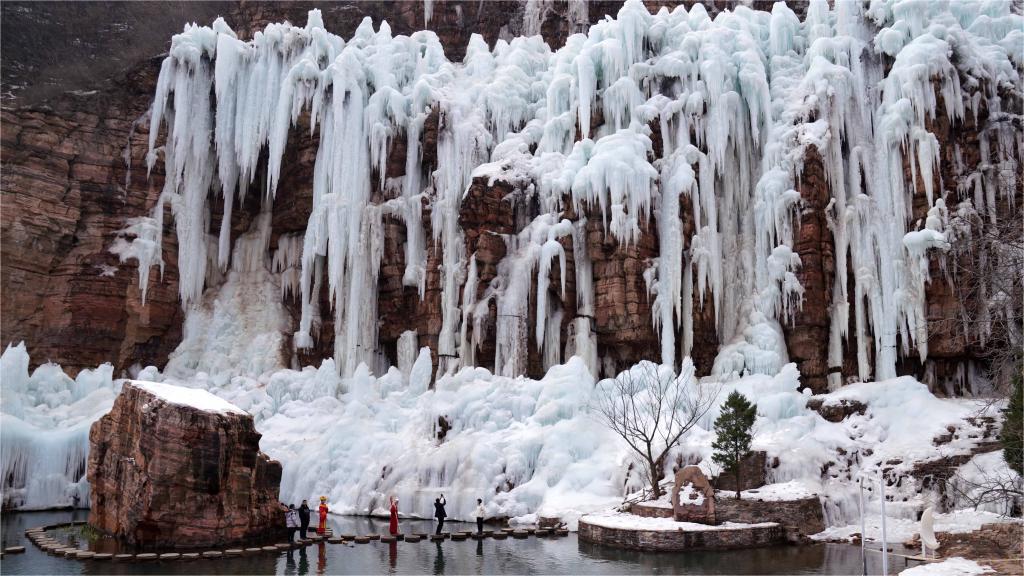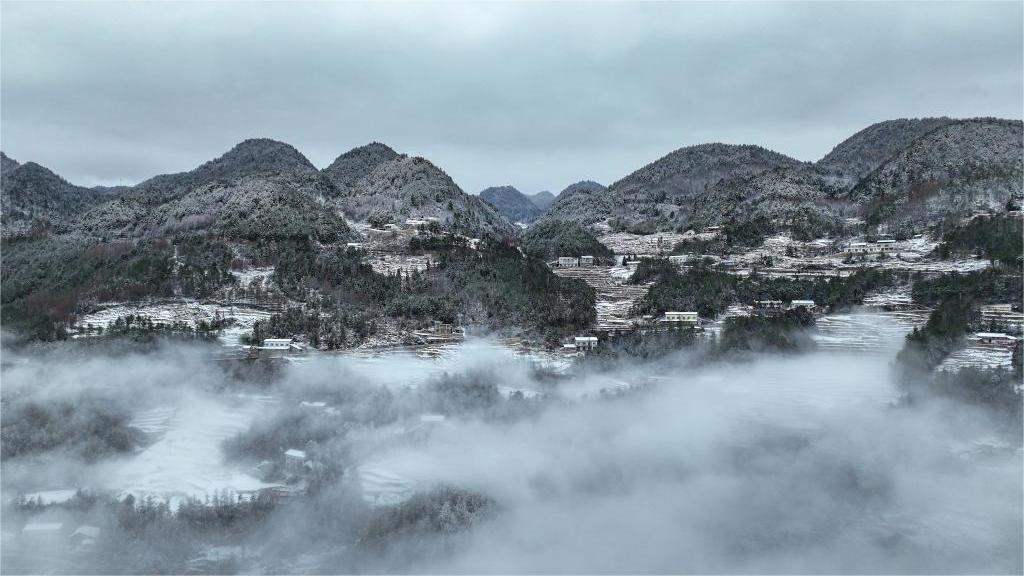Meteorological authority escalates cold wave alert, forecasting drastic temperature dropping in majority parts across China

Strong winds and snowstorms hit Jiuquan, Northwest China's Gansu Province, since February 17, 2024, with the minimum level of visibility dropping to less than 20 meters. Photo: CCTV News
China's top meteorological authority issued three extreme weather alerts simultaneously on Sunday morning, warning of drastic temperature drops, freezing weather and sandstorm affecting vast swathes of the country over the following week, hindering return journeys back to work after the tradition family reunion holiday of Spring Festival, also known as the Chinese New Year.
China's National Meteorological Center (NMC) escalated its warning for freezing weather condition to an orange alert, the second highest level, on Sunday morning, forecasting that drastic temperature drops will occur in majority parts across China with the average temperature drops ranging from 8 C to 12 C from Sunday through Thursday. Temperature drops in some places including the middle and eastern parts of North China's Inner Mongolia Autonomous Region, Northeast China and some parts of Central China's Hubei and Hunan provinces can reach 20 C or above.
Meanwhile, the cold wave will be accompanied by strong winds and dust. The NMC also issued blue warnings for strong winds and sandstorm, forecasting strong winds and sandstorm weather conditions will affect provinces and regions including Northwest China's Xinjiang Uygur Autonomous Region, Gansu and Qinghai provinces and Southwest China's Xizang Autonomous Region from Sunday to Monday.
Affected by the strong cold front, Xinjiang in particular has experienced the strongest freezing weather process this year. As of 8 am on Sunday, four meteorological stations in the eastern part of Altay reported temperature drops of over 30 C. The temperature in Tuerhong Township in Fuyun county, Altay dropped to -52.3 C, breaking the extreme lowest temperature on record in Xinjiang set on January 21, 1960, China Central Television (CCTV) reported on Sunday.
In Northwest China's Gansu Province, more than 40,000 tourists were stranded in Jiuquan city due to traffic control related to a snowstorm, windy and dusty weather which started on Saturday morning, according to CCTV.
Temporary traffic controls have been put in place on expressways including Lianyungang-Horgos expressway connecting the port cities of Khorgas city in Xinjiang and Lianyungang in East China's Jiangsu Province, and Beijing-Urumqi Expressway linking the Chinese capital Beijing and Urumqi, the regional capital of Xinjiang, causing a large number of passengers stranded in Jiuquan.
Local authorities promptly launched emergency response measures and over 42,929 stranded tourists had been resettled as of 8 am on Sunday, including over 25,000 tourists stranded in Guazhou county.
Strong winds and snowstorms hit Jiuquan since Saturday afternoon with the minimum level of visibility dropping to less than 20 meters. Local authorities exerted traffic controls at all the toll stations in the Jiuquan section of Lianyungang-Horgos expressway toward Xinjiang. Over 20,000 tourists from other places were stranded due to traffic controls, according to the information office of Guazhou county people's government.
The local authorities promptly allocated 6,000 beds from the local hotels and 1,700 beds from local schools as well as the meeting rooms and dining halls at the hotels for resettling the stranded tourists.
Meteorological authorities and experts have warned that the challenging weather condition combined with multiple extreme weather phenomena will have a great impact on tourists on their return journey to their workplace after the holiday. Ma Jun, director of the Beijing-based Institute of Public and Environmental Affairs, told the Global Times on Sunday that the widespread sandstorms in Xinjiang, Inner Mongolia and Northwest China's Shaanxi Province have already exerted a great impact. It will further affect North China's Shanxi Province and Hebei Province afterwards.
China's National Early Warning Centre issued several warnings on Saturday night to warn ahead of sandstorms in multiple places including the orange alerts for sandstorms in, Xinjiang, Shaanxi, Inner Mongolia, and Northwest China's Ningxia Hui Autonomous Region. Several netizens filmed videos of the orange sky in Xinjiang blanketed by heavy sandstorm. A tourist surnamed Pan who fought through the strong wind and heavy sandstorm on the highway in Xinjiang said the rear window of her vehicle was smashed and blown away, Red Star News reported.
Ma warned that it is noteworthy that the following extreme weather conditions of widespread snowstorm in the northern areas and especially the freezing rain in the central and southern areas which will exert great impact on travelers. Ma noted that freezing rain is not very common for this time of year.
Ma further noted that under the backdrop of global warming, the rising temperature in the North Pole will cause stronger cold waves heading downwards to the south.
Photos
Related Stories
- 2023 the warmest year in China since 1951: report
- Meteorological authority issues four extreme weather warnings; freezing weather strands travelers returning home for Spring Festival
- China activates Level-IV emergency response to low temperatures in Hubei, Hunan
- China renews blue alert for gales
- Record cold strands thousands
- Extreme weather prompts suspension of more trains in NW China
Copyright © 2024 People's Daily Online. All Rights Reserved.









